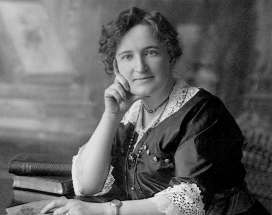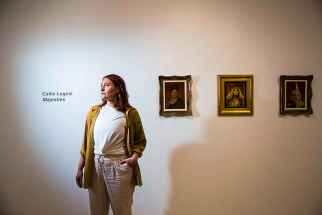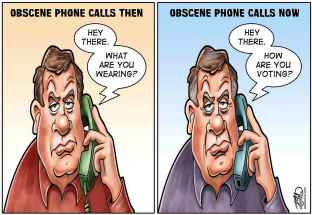Nobel laureate Toni Morrison dead at 88 "If there's a book that you want to read, but it hasn't been written yet, then you must write it." By: Hillel Italie, The Associated Press Posted: Last Modified:
Read this article for free:
or
Already have an account? Log in here »
To continue reading, please subscribe:
Monthly Digital Subscription
$0 for the first 4 weeks*
- Enjoy unlimited reading on winnipegfreepress.com
- Read the E-Edition, our digital replica newspaper
- Access News Break, our award-winning app
- Play interactive puzzles
*No charge for 4 weeks then price increases to the regular rate of $19.00 plus GST every four weeks. Offer available to new and qualified returning subscribers only. Cancel any time.
Monthly Digital Subscription
$4.75/week*
- Enjoy unlimited reading on winnipegfreepress.com
- Read the E-Edition, our digital replica newspaper
- Access News Break, our award-winning app
- Play interactive puzzles
*Billed as $19 plus GST every four weeks. Cancel any time.
To continue reading, please subscribe:
Add Free Press access to your Brandon Sun subscription for only an additional
$1 for the first 4 weeks*
*Your next subscription payment will increase by $1.00 and you will be charged $16.99 plus GST for four weeks. After four weeks, your payment will increase to $23.99 plus GST every four weeks.
Read unlimited articles for free today:
or
Already have an account? Log in here »
Hey there, time traveller!
This article was published 06/08/2019 (2320 days ago), so information in it may no longer be current.
NEW YORK – Nobel laureate Toni Morrison, a pioneer and reigning giant of modern literature whose imaginative power in “Beloved,” ”Song of Solomon” and other works transformed American letters by dramatizing the pursuit of freedom within the boundaries of race, has died at age 88.
Publisher Alfred A. Knopf announced that Morrison died Monday night at Montefiore Medical Center in New York. Morrison’s family issued a statement through Knopf saying she died after a brief illness.
“Toni Morrison passed away peacefully last night surrounded by family and friends,” the family announced. “The consummate writer who treasured the written word, whether her own, her students or others, she read voraciously and was most at home when writing.”
Few authors rose in such rapid, spectacular style. She was nearly 40 when her first novel, “The Bluest Eye,” was published. By her early 60s, after just six novels, she had become the first black woman to receive the Nobel literature prize, praised in 1993 by the Swedish academy for her “visionary force” and for her delving into “language itself, a language she wants to liberate” from categories of black and white. In 2012, Barack Obama awarded her a Presidential Medal of Freedom.
“Her writing was not just beautiful but meaningful — a challenge to our conscience and a call to greater empathy,” Obama wrote Tuesday on his Facebook page. “She was as good a storyteller, as captivating, in person as she was on the page.”
“Her writing was not just beautiful but meaningful — a challenge to our conscience and a call to greater empathy.”–Barack Obama
Morrison helped raise American multiculturalism to the world stage and helped uncensor her country’s past, unearthing the lives of the unknown and the unwanted, those she would call “the unfree at the heart of the democratic experiment.” In her novels, history — black history — was a trove of poetry, tragedy, love, adventure and good old gossip, whether in small-town Ohio in “Sula” or big-city Harlem in “Jazz.”
Notable quotes by Toni Morrison
”If there’s a book that you want to read, but it hasn’t been written yet, then you must write it.”
-From a 1981 speech to the Ohio Arts Council.
“If there’s a book that you want to read, but it hasn’t been written yet, then you must write it.”
-From a 1981 speech to the Ohio Arts Council.
“There is a loneliness that can be rocked. Arms crossed, knees drawn up, holding, holding on, this motion, unlike a ship’s, smooths and contains the rocker. It’s an inside kind — wrapped tight like skin. Then there is the loneliness that roams. No rocking can hold it down. It is alive. On its own. A dry and spreading thing that makes the sound of one’s own feet going seem to come from a far-off place.”
-From her novel “Beloved,” winner of the Pulitzer Prize in 1988.
“Our past is bleak. Our future dim. But I am not reasonable. A reasonable man adjusts to his environment. An unreasonable man does not. All progress, therefore, depends on the unreasonable man. I prefer not to adjust to my environment. I refuse the prison of ‘I’ and choose the open spaces of ‘we’.”
-From her 2019 book “The Source of Self-Regard: Selected Essays, Speeches, and Meditations.”
“What was I thinking of? How could I have imagined him so poorly? Not noticed the hurt that was not linked to the colour of his skin, or the blood that beat beneath it. But to some other thing that longed for authenticity, for a right to be in this place, effortlessly without needing to acquire a false face, a laughless grin, a talking posture.”
-From her 1992 novel “Jazz.”
“It is the language that drinks blood, laps vulnerabilities, tucks its fascist boots under crinolines of respectability and patriotism as it moves relentlessly toward the bottom line and the bottomed-out mind. Sexist language, racist language, theistic language – all are typical of the policing languages of mastery, and cannot, do not permit new knowledge or encourage the mutual exchange of ideas.”
-From her 1993 Nobel Prize lecture.
“If you surrender to the air, you could ride it.”
-The final words from her 1977 novel “Song of Solomon.”
She regarded race as a social construct and through language founded the better world her characters suffered to attain. Morrison wove everything from African literature and slave folklore to the Bible and Gabriel Garcia Marquez into the most diverse, yet harmonious, of literary communities.
“Narrative has never been merely entertainment for me,” she said in her Nobel lecture. “It is, I believe, one of the principal ways in which we absorb knowledge.”
Winner of the 1988 Pulitzer Prize for “Beloved,” she was one of the book world’s most regal presences, with her expanse of graying dreadlocks; her dark, discerning eyes; and warm, theatrical voice, able to lower itself to a mysterious growl or rise to a humorous falsetto. “That handsome and perceptive lady,” James Baldwin called her.
Her admirers were countless — from fellow authors, college students and working people to Obama and fellow former President Bill Clinton; to Oprah Winfrey, who idolized Morrison and helped greatly expand her readership. Morrison shared those high opinions, repeatedly labeling one of her novels, “Love,” as “perfect” and rejecting the idea that artistic achievement called for quiet acceptance.
“Maya Angelou helped me without her knowing it,” Morrison told The Associated Press during a 1998 interview. “When she was writing her first book, ‘I Know Why the Caged Bird Sings,’ I was an editor at Random House. She was having such a good time, and she never said, ‘Who me? My little book?’
“I decided that … winning the (Nobel) prize was fabulous,” Morrison added. “Nobody was going to take that and make it into something else. I felt representational. I felt American. I felt Ohioan. I felt blacker than ever. I felt more woman than ever. I felt all of that, and put all of that together and went out and had a good time.”
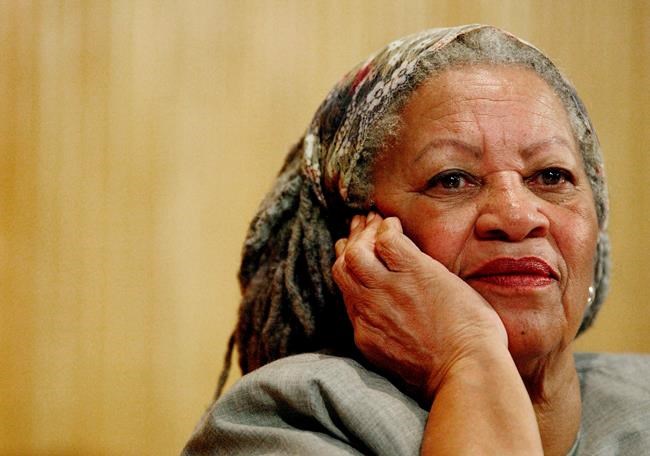
The second of four children of a welder and a domestic worker, Morrison was born Chloe Ardelia Wofford in Lorain, Ohio, a steel town outside of Cleveland. She was encouraged by her parents to read and to think, and was unimpressed by the white kids in her community.
Recalling how she felt like an “aristocrat,” Morrison believed she was smarter and took it for granted she was wiser. She was an honours student in high a school, and attended Howard University because she dreamed of life spent among black intellectuals.
At Howard, she spent much of her free time in the theatre (she had a laugh that could easily reach the back row), later taught there and also met and married a Jamaican architect, Harold Morrison, whom she divorced in 1964. They had two children, Harold and Slade.
But although she went on to teach there, Howard disappointed her. Campus life seemed closer to a finishing school than to an institution of learning. Protesters, among them former Morrison student Stokely Carmichael, were demanding equality. Morrison wanted that, too, but wondered what kind.
‘Genius has moved on’: reactions to Toni Morrison’s death
”I was very saddened to hear of the death of the great American novelist Toni Morrison, a giant of her times and ours. Her novel, Beloved, is a heartbreaking testimony to the ongoing ravages of slavery, and should be read by all. That her strong voice will now be missing in this age of the renewed targeting of minorities in the United States and elsewhere is a tragedy for the rest of us.”
—Margaret Atwood, in a statement.
“I was very saddened to hear of the death of the great American novelist Toni Morrison, a giant of her times and ours. Her novel, Beloved, is a heartbreaking testimony to the ongoing ravages of slavery, and should be read by all. That her strong voice will now be missing in this age of the renewed targeting of minorities in the United States and elsewhere is a tragedy for the rest of us.”
—Margaret Atwood, in a statement.
“Toni Morrison was a national treasure. Her writing was not just beautiful but meaningful — a challenge to our conscience and a call to greater empathy. She was as good a storyteller, as captivating, in person as she was on the page. And so even as Michelle and I mourn her loss and send our warmest sympathies to her family and friends, we know that her stories — that our stories — will always be with us, and with those who come after, and on and on, for all time.”
—former President Barack Obama, via Twitter.
“My heart hurts. Her greatness was absolute. Her words changed worlds. Her work always belonged to the immortal, and her name will never be forgotten.”
—author Elizabeth Gilbert, via Facebook.
“The passing of Toni Morrison is a mandate to all others in the field to fulfil the high calling that her work and her life demonstrated. Her words, her wisdom, her undying love and commitment to her people are forever engraved in the pages of history, but her artistic, remarkable literary voice will be deeply missed.”
—Rep. John Lewis, in a statement.
“Today, the world lost a storyteller of unmatched empathy, elegance and power. Toni Morrison’s belief that language is the “measure of our lives” leaves an extraordinary, inspiring inheritance, and her beautiful writing will continue to be a blessing for generations to come.”
—House Speaker Nancy Pelosi, via Twitter.
“RIP Toni Morrison. This is a devastating loss to the world of words, to our understanding of power and it’s reach, to the cultivation of empathy, to rich, nuanced, elegant storytelling. Her work was a gift to every one who had the pleasure of reading her.”
—Roxane Gay, via Twitter.
“I just assumed Ms. Morrison would live forever. And in so many ways in so many hearts and minds and spirits, she will.”
—filmmaker Barry Jenkins, via Twitter.
“Toni Morrison was a towering intellect, a brilliant scribe of our nation’s complex stories, a heartbreaking journalist of our deepest desires, and a groundbreaking author who destroyed precepts, walls and those who dared underestimate her capacity. Rest well and in peace.”
—former Georgia Democratic gubernatorial candidate Stacey Abrams, via Twitter.
“Her words were like mirrors to our collective souls. Like pillows to cushion the blows. Like mothers to wrap us in love. Like friends to hold our hands and see us through the darkness. #RipToniMorrison (heart) you. May we lift her up in the light of goodness and hold her there.”
—Gabrielle Union, via Twitter.
“She was the best of us: our strength, our hope, and most importantly, our history. I grieve her passing though I know she will never, ever be gone.”
—Walter Mosley, via Facebook.
“Genius has moved on. She made me understand “writer” was a fine profession. I grew up wanting to be only her. Dinner with her was a night I will never forget. Rest, Queen.”
—Shonda Rhimes, via Twitter.
“I thought they wanted to integrate for nefarious purposes,” she said. “I thought they should demand money in those black schools. That was the problem — the resources, the better equipment, the better teachers, the buildings that were falling apart — not being in some high school next to some white kids.”
In 1964, she answered an ad to work in the textbook division of Random House. Over the next 15 years, she would have an impact as a book editor, and as one of the few black women in publishing, that alone would have ensured her legacy.
She championed emerging fiction authors such as Gayl Jones and Toni Cade Bambara, helped introduce U.S. readers to such African writers as Nobel laureate Wole Soyinka, worked on a memoir by Muhammad Ali and topical books by such activists as Angela Davis and Black Panther Huey Newton. A special project was editing “The Black Book,” a collection of everything from newspaper advertisements to song lyrics that anticipated her immersion in the everyday lives of the past.
By the late ’60s, she was a single mother and a determined writer who had been pushed by her future editor, Robert Gottlieb of Alfred A. Knopf, into deciding whether she’d write or edit. Seated at her kitchen table, she fleshed out a story based on a childhood memory of a black girl in Lorain — raped by her father — who desired blue eyes. She called the novel “The Bluest Eye.”

Morrison prided herself on the gift of applying “invisible ink,” making a point and leaving it to the reader to discover it, such as her decision to withhold the skin colour of her characters in “Paradise.” Her debut as an author came at the height of the Black Arts Movement and calls for literature as political and social protest. But Morrison criticized by indirection; she was political because of what she didn’t say. Racism and sexism were assumed; she wrote about their effects, whether in “The Bluest Eye” or in “Sula,” a story of friendship and betrayal between two black women.
“The writers who affected me the most were novelists who were writing in Africa: Chinua Achebe, ‘Things Fall Apart,’ was a major education for me,” Morrison, who had studied William Faulkner and Virginia Woolf as a graduate student, told the AP in 1998.
“They took their black world for granted. No black writer (in America) had done that except for Jean Toomer with ‘Cane.’ Everybody else had some confrontation with white people, which was not to say that Africans didn’t, but there was linguistically an assumption. The language was the language of the centre of the world, which was them.
“So that made it possible for me to write ‘The Bluest Eye’ and not explain anything. That was wholly new! It was like a step into an absolutely brand new world. It was liberating in a way nothing had been before!”
She had no agent and was rejected by several publishers before reaching a deal with Holt, Rhinehart and Winston (now Henry Holt and Company), which released the novel in 1970. Sales were modest, but her book made a deep impression on The New York Times’ John Leonard, an early and ongoing champion of her writing, which he called “so precise, so faithful to speech and so charged with pain and wonder that the novel becomes poetry.”
Setting her stories in segregated communities, where incest and suicide were no more outrageous than a sign which reads “COLORED ONLY,” Morrison wrote of dreamers for whom the price was often death, whether the mother’s tragic choice to murder her baby girl — and save it from slavery — in “Beloved,” or the black community that implodes in “Paradise.”
Like Faulkner, her characters are burdened by the legacy, and ongoing tragedy, of slavery and separation. For Faulkner’s white Southerners, losers of the Civil War, the price is guilt, rage and madness; for Morrison’s slaves and their descendants, supposedly liberated, history follows like the most unrelenting posse.
“The future was sunset; the past something to leave behind,” Morrison wrote in “Beloved,” in which the ghost of the slain daughter returns to haunt and obsess her mother.
“And if it didn’t stay behind, well, you might have to stomp it out. Slave life; freed life — every day was a test and a trial. Nothing could be counted on in a world where even when you were a solution you were a problem.”
“So scary are the consequences of a collapse of white privilege that many Americans have flocked to a political platform that supports and translates violence against the defenceless as strength. These people are not so much angry as terrified, with the kind of terror that makes knees tremble”
–Toni Morrison
Morrison’s breakthrough came in 1977 with “Song of Solomon,” her third novel and the story of young Milkman Dead’s sexual, social and ancestral education. It was the first work by a black writer since Richard Wright’s “Native Son” to be a full Book-of-the-Month selection and won the National Book Critics Circle award. It was also Morrison’s first book to centre on a male character, a novel that enabled her “get out of the house, to de-domesticate the landscape.”
But the mainstream was another kind of education. Reviewing “Song of Solomon,” author Reynolds Price chided Morrison for “the understandable but weakening omission of active white characters.” (He later recanted.) When “Beloved” was overlooked for a National Book Award, a letter of protest from 48 black writers, including Angelou and Amiri Baraka, was published in The New York Times Book Review, noting that Morrison had never won a major literary prize.
“Beloved” went on to win the Pulitzer and Morrison soon ascended to the very top of the literary world, winning the Nobel and presiding as unofficial laureate of Winfrey’s book club, founded in 1996. Winfrey chose “Song of Solomon,” ”The Bluest Eye,” ”Paradise” and “Sula” over the years and would list all of Morrison’s works as among her favourites. Winfrey also starred in and helped produce the 1998 film version of “Beloved.”
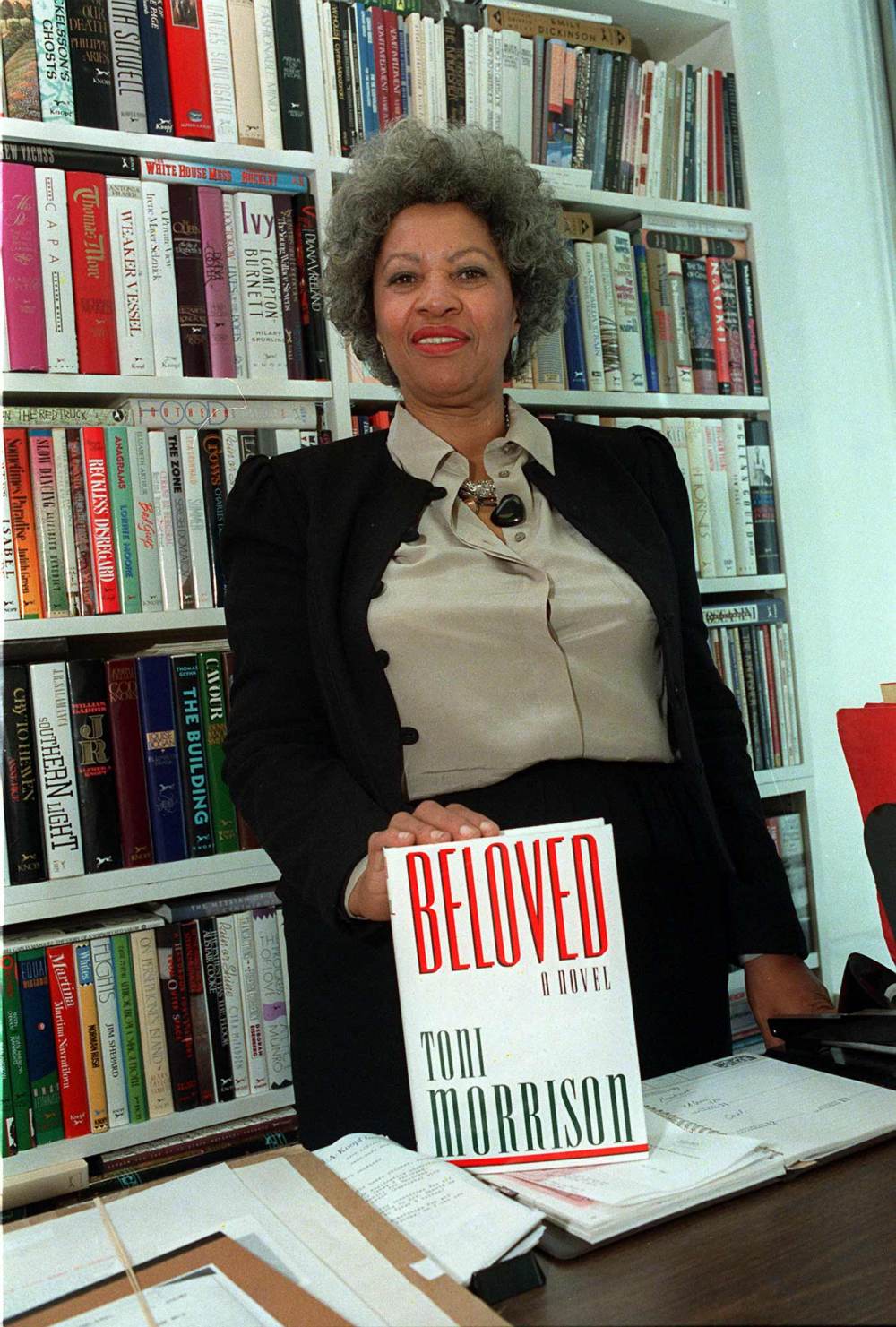
As with so many other laureates, Morrison’s post-Nobel fiction was viewed less favourably than her earlier work. Morrison received no major competitive awards after the Nobel and was criticized for awkward plotting and pretentious language in “Love” and “Paradise.” But a novel published in 2008, “A Mercy,” was highly praised. “Home,” a brief novel about a young Korean War veteran, came out in 2012 and was followed three years later by a contemporary drama, “God Help the Child.” Morrison herself was the subject of an acclaimed documentary, “Toni Morrison: The Pieces I Am,” which came out this year.
Morrison’s other works included “Playing in the Dark,” a collection of essays; “Dreaming Emmett,” a play about the slain teenager Emmett Till; and several children’s books co-authored with her son, Slade Morrison (who died of cancer in 2010). In November 2016, she wrote a highly cited New York essay about the election of Donald Trump, calling his ascension to the presidency a mark of what whites would settle for to hold on to their status.
“So scary are the consequences of a collapse of white privilege that many Americans have flocked to a political platform that supports and translates violence against the defenceless as strength. These people are not so much angry as terrified, with the kind of terror that makes knees tremble,” she wrote.
“William Faulkner understood this better than almost any other American writer. In ‘Absalom, Absalom,’ incest is less of a taboo for an upper-class Southern family than acknowledging the one drop of black blood that would clearly soil the family line. Rather than lose its “whiteness” (once again), the family chooses murder.”
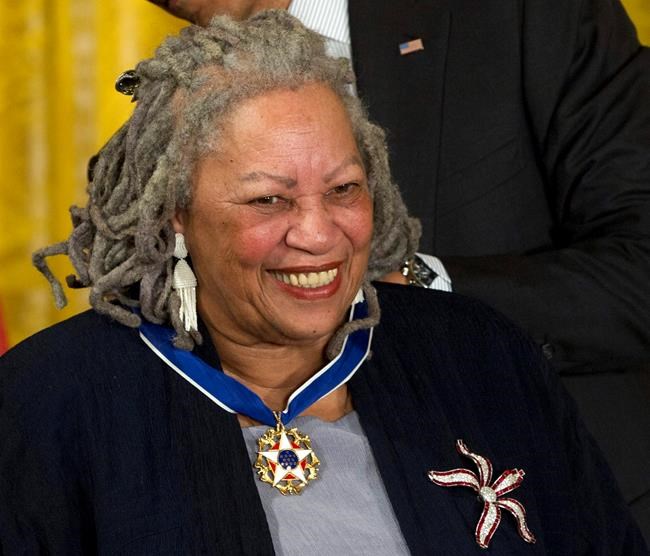
She taught for years at Princeton University, from which she retired in 2006, but also had an apartment in downtown Manhattan and a riverfront house in New York’s Rockland County that burned down in 1993, destroying manuscripts, first editions of Faulkner and other writers and numerous family mementoes. She had the house rebuilt and continued to live and work there.
“When I’m not thinking about a novel, or not actually writing it, it’s not very good; the 21st century is not a very nice place. I need it (writing) to just stay steady, emotionally,” she told the AP in 2012.
“When I finished ‘The Bluest Eye’ … I was not pleased. I remember feeling sad. And then I thought, ‘Oh, you know, everybody’s talking about “sisterhood,'” I wanted to write about what women friends are really like. (The inspiration for ‘Sula’). All of a sudden the whole world was a real interesting place. Everything in it was something I could use or discard. It had shape. The thing is — that’s how I live here.”






